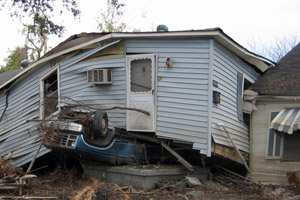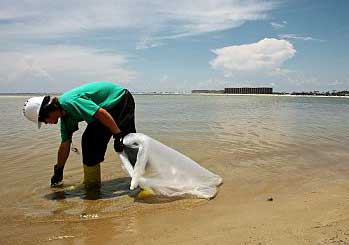
<a href="http://jellowrestle.com/gallery/brianvan082706/slides/_DSC2284.html">Brian Van/jellowrestle.com</a>
I hear about the race riot at Daddy’s Money almost as soon as I arrive on Grand Isle, Louisiana. My friend and I are going to the bar tonight to catch the “female oil wrestling” oil-spill cleanup workers have been packing in to see on Saturday nights. When we stop by the office of the island’s biggest seafood distributor, he tells us that two days ago a bunch of black guys and a bunch of white guys got into a big fight at the bar. It spilled out all over the street and had to be broken up by a ton of cops.
According to the Census, 1,541 people live in this slow Southern resort town. An estimated 3 percent of them are black. That was before the spill. The seafood guy gestures in the direction of the floating barracks being built on barges in the bay to house the lower-skilled cleanup workers, and says that people think the barracks will keep those workers—who are mostly black—from “jumping off” onto dry land and causing trouble.
That night, dozens of men in race-segregated packs crowd around to watch strippers dance around and then tussle inside the bouncy inflatable ring set up inside Daddy’s Money. Female oil wrestlers need, obviously, to be oiled. Plastic cups full of baby oil are being auctioned off, along with the right to rub their contents all over one of the thong-bikinied gals. “I hope there’s no dispersant in that oil!” someone quips. The bidding before the first match starts at $10; it ends pretty quickly when some kid offers $100.
“He outbid me!” the guy next to me yells. His name is Cortez. He bid $80. He has dollar bills tucked all the way around under the brim of his hat, and piles of them in his fist. He has spent $200 of his $1,000 paycheck already tonight. “I am coming here every Saturday from now on,” he says. He gestures expansively at the scene—writhing women; hollering, money-throwing men. “Sponsored by BP!” he yells, laughing, then throws his arms around me and grabs my ass.
Upstairs, on the open-air deck, the supervisors and professional contractors drink. One comes over to talk; he calls me a Yankee when I don’t get that when he says “animals” he means black guys. Another tells us about the crime-prone “monkeys.” I have already stopped counting how many times I’ve heard the n-word on Grand Isle today.
Back downstairs, the testosterone is still spewing. It’s not just the men screaming at the now-topless girls rolling around trying to pin each other to the floor. An ex-Army Ranger so drunk he can hardly stand asks me if I have a boyfriend. When I lie and say that I do and he’s right over there somewhere, the Ranger scowls and pushes me. I move to the other side of the ring, where some guy wraps a tight grip around my waist.
“You can have some of BP’s money too if you let me make love to you,” he says.
“I’m not a prostitute,” I inform him, backing up to create some space between our pelvises, but he presses an insistent forearm harder into the small of my back.
“I’m not trying to play you like a prostitute,” he says. “I’m just saying: Whatever it takes.”
I extract myself with a firm fist to his chest. Two Grand Isle girls who are the only other non-strippers in the bar are trying to inch away from a teetering drunk who won’t take his hands off them and is encouraging them to get in the ring. I turn around to see if an Interior Department firefighter I talked to earlier, who seems like a nice guy in that he offered to buy me dinner rather than offering money to have sex with him, is still behind me. Just in case. Because he’s a hero he steps in and tells the teetering guy to back off.
“That’s my wife,” he says, towering over the drunk and pointing at one of the girls.
“I don’t care,” the teetering guy says. That’s where it ends. The fireman has a thick four-inch-long scar behind his ear where he was once hit with a bottle; he doesn’t start bar fights anymore. Which is a lucky thing for his coworkers, because he’s a very buff Pawnee, and he’s sick of them calling him “Tonto,” “Chief,” and “Indian Joe.”
The near-desperate levels of racial and sexual aggression in this horde aren’t what you usually get at a strip show in a bar. It feels more like a strip show in a prison yard. My friend says he’s leaving because he can’t bear to be here with all the stupidity and “stale testosterone” anymore. He returns from the bar across the street within 10 minutes. He walked in and walked right back out; it was the same scene. Last week, someone was stabbed there.
Upstairs, one of the cleanup supervisors announces that a nearby Canadian engineer hasn’t had any pussy in 10 days, and could die. The guys say there’s an old Vietnamese lady with a notebook full of available hookers’ ages and races who wanders the cleanup workers’ haunts, but she’s not here right now. Anyway, the workers are forbidden from bringing hookers into the houses and hotel rooms their employers are putting them up in, under threat of being fired.
“How long are you going to be here?” I ask the contractor who’s worried about the sexless Canadian.
“We aren’t leaving till this is all clean,” he answers, “we” being M-I SWACO, a cleanup contractor that just built a giant orange-pipe-jumble sand-washing machine on the beach (and which is not to be confused with the contractors who are doing only “window dressing” operations, as one of the other supervisors at the bar describes his job). M-I SWACO is not just going to polish the destruction off the surface. They’re going to have oiled sand from all over the island brought in by the truckload, then dig out the contaminated layers, wash it, and put it back, at least 40 tons of sand an hour. They’re going to save this place.
“We’ll be here as long as oil keeps washing up,” the contractor says.
“So…” I laugh sort of helplessly. “A year?”
“Three years…” he says. “Five years…”
“Hopefully forever,” the guy next to him says. “I need this job if I can’t work offshore anymore.” Last week, the emcee that accompanies the oil wrestlers yelled into the microphone, “Let that oil gush! Let that money flow!” The workers—part of the new Grand Isle scenery of helicopters, Hummers, and National Guardsmen, serious people in uniforms and coveralls and work boots—the workers around the wrestling ring, drunk and blowing cash from jobs that might kill them, cheered.













